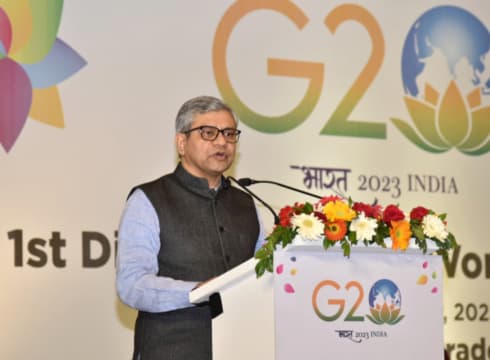The Bill will now be presented before both houses of the Parliament for passage
The Bill proposes the concept of data fiduciary and has mandated new changes, including the right of a user to give, manage, and withdraw consent for sharing information
The draft Bill bars data processing platforms from undertaking behavioural monitoring of children
Inc42 Daily Brief
Stay Ahead With Daily News & Analysis on India’s Tech & Startup Economy
Union Communications Minister Ashwini Vaishnaw on Thursday (March 2) said that the Parliamentary Standing Committee on Information Technology has given its assent to the draft Digital Personal Data Protection Bill (DPDPB).
“I would like to share some good news that the Parliamentary Standing Committee on IT and communications, which is the committee which deals with this subject, before the bill is taken to the Parliament, have in advance examined it, and then given a big thumbs up,” Vaishnaw said.
The minister made the comments while addressing the 2023 edition of the NASSCOM Technology Leadership Forum.
Addressing the event, the minister said that the country was trading on the path of simplification of multiple regulations. Elaborating on this, Vaishnaw said that the Centre has so far repealed 1,500 archaic laws and removed more than 40,000 compliances.
Vaishnaw noted that Indian startups have made big strides since the launch of the Startup India initiative in 2016.
“See the progress the country and the startups have made since then. The recognition for these is global now. People see India as a very important innovation hub,” Vaishnaw said.
The Parliamentary panel apparently gave its nod to the Bill after examining the much-debated draft norms. The Bill, which was published in November 2022, has proposed a slew of reforms to govern the burgeoning Indian digital ecosystem. The Bill proposes the concept of data fiduciary and has mandated new changes, including the right of a user to give, manage, and withdraw consent for sharing information.
Not just this, the draft norms also bar data processing platforms from undertaking behavioural monitoring of children or target advertising. The draft Bill also sets a penalty of up to INR 500 Cr for non-compliance.
This is the third iteration of the Digital Data Protection Bill. While the first draft norms, introduced in 2019, stayed in limbo for three years, the subsequent two iterations were introduced in a matter of months. The new Bill inches closer to fruition weeks after it was reported that the government would stick to 18 years of age as the threshold to define minors under the proposed laws.
The DPDPB comes close on the heels of a slew of reforms, proposals and proposed regulations in the overarching digital landscape. From the much-awaited Digital India Act to Telecommunications Bill, 2022, multiple new legislations are in the pipeline to oversee the homegrown digital landscape.
{{#name}}{{name}}{{/name}}{{^name}}-{{/name}}
{{#description}}{{description}}...{{/description}}{{^description}}-{{/description}}
Note: We at Inc42 take our ethics very seriously. More information about it can be found here.


